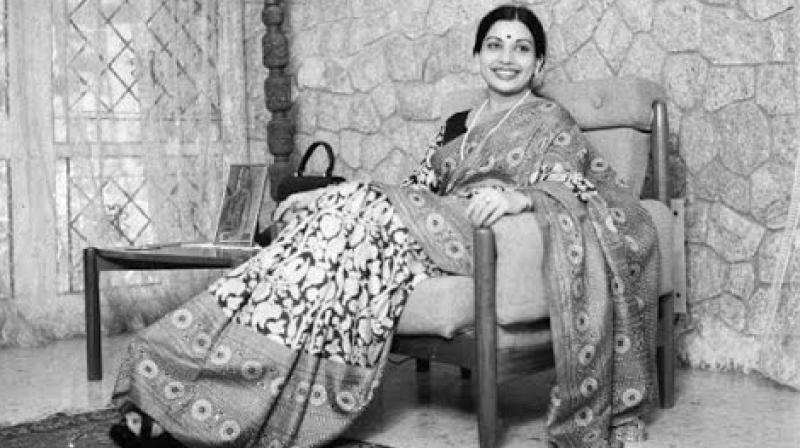J Jayalalithaa: The Superstar
Before she forayed into politics, Jayalalithaa had a successful career in cinema from 1961 to 1980.

For nearly five decades in public life – as an accomplished actress and venerable politician -- Jayalalithaa Jayaraman was at once the ‘Iron Lady of Tamil Nadu’ and ‘Amma’ to her admirers all over the country.
Before stepping into politics and becoming the supremo of the All India Anna Dravida Munnetra Kazhagam (AIADMK), Jayalalithaa successful career in cinema flourished from 1961 to 1980.
Born into a Tamil Iyenger Brahmin family on February 24, 1948, Jayalalithaa’s father Jayaram was a lawyer. She was just two years old when her father passed away and she, along with her mother Vedavalli returned to her father’s house in Bangalore in 1950. While her mother tried her luck in the film industry under the screen name Sandhya, Jayalalithaa remained in Mysore with her mother’s sister Padmavalli and maternal grandparents from 1950 to 1958.
Jayalalithaa trained in classical music, western classical piano including various forms of classical dance such as Bharatanatyam, Mohiniattam, Manipuri and Kathak in Chennai. Under her Bharatanatyam Guru K J Sarasa’s wings, she became an accomplished dancer and in May 1960, she gave her dance debut performance at the Rasika Ranjani Sabha in Mylapore. She was 12.
Shivaji Ganesan, who was the chief guest at the Arangetram, told mother Sandhaya that her daughter had the spark to be a huge filmstar one day.
After her dance stint, Jayalalithaa stepped into cinema in 1961 and soon enough, ruled the industry as the ‘Uncrowned Queen of Tamil cinema’. She appeared in more than 140 films which include those in Tamil, Telugu and Kannada.
In 1961, she made her debut as a child artist with Kannada film Sri Shaila Mahathme which starred Rajkumar and Krishna Kumari in prominent roles. Still in school, Jayalithaa featured in few English and Tamil plays of Y.G. Parthasarathy, who ran a drama troupe United Amateur Artistes (UAA).
After the then Indian President V V Giri’s son Shankar Giri saw her performance in the English play called ‘Tea Houses of August Moon’, he approached Sandhya and informed her that he wanted to cast her daughter Jayalalithaa in an English film titled ‘The Epistle’ (1961). Jayalalithaa’s mother agreed on one condition that the shooting should be conducted only during weekends or holidays so her daughter’s school doesn’t get affected.
Prepping to start her classes at Stella Maris and pursuing her dream of becoming a lawyer, Jayalalithaa had forgotten all about her Kannada debut film, though she continued featuring in Y.G. Parthasarathy’s plays but the film offers never stopped pouring in.
After ‘Sri Shaila Mahathme’, ‘Man Mauji’ and ‘Mane Aliya’, Jayalalithaa made her debut in Kannada film industry as a lead actress in 1964 with ‘Chinnada Gombe’ at the age of 15. The same year, she also stepped in Telugu industry with her film ‘Manushulu Mamathalu’, which starred Akkineni Nageswara Rao opposite her. Both the films turned out to be a blockbuster at the box office, making Jayalalithaa a popular name among directors and producers. In year 1965, she made her Tamil debut as a lead actress with ‘Vennira Aadai’ by filmmaker C.V. Sridhar.
In year 1966, Jayalalithaa had 11 releases in Tamil. Ever since then, there was no stopping. The same year she first appeared in a double role in ‘Yaar Nee’. Among her many firsts, she was also the first actress to don skirts in Tamil films. The same year, her name was attached with the phrase ‘Kavarchi Kanni’ in film ‘Arasa Katalai’.
In 1968, she starred in the Bollywood film ‘Izzat’ alongside Dharmendra. Between 1965 and 1973, she gave 28 box office hits with M G Ramachandran.
She appeared in 12 films opposite N T Rama Rao whereas she romanced Jaishankar in 8 Tamil films. She also gave 10 hit Tamil films with Ravichandran including ‘Kumari Penn’, ‘Gowri Kalyanam’, ‘Magarasi’ among other films. Her film ‘Pattikada Pattanama (1971) opposite Sivaji Ganesan won National Film Award for Best Feature Film in Tamil and her performance as Kanchana earned her Filmfare Award for Best Actress.
In 1966, 1969 and 1970, Jayalilthaa was also awarded with Special Award from Filmfare and Tami Nadu government for her stellar performances in ‘Chandhrodhayam’, ‘Adimai Penn’ and ‘Engirundho Vandhaal’. She won Filmfare Award for Best Actress in 1973 for ‘Suryagandhi’, and another for her Telugu film ‘Sri Krishna Satya’.
She completed her century in the film industry with filmmaker A Vincent’s ‘Thirumangalyam’ (1974). In 1980, Jayalalithaa appeared in her last Tamil and Telugu film, ‘Nadhiyai Thedi Vandha Kadal’ and ‘Nayakudu Vinayakudu’, respectively, while the latter went on to become the highest grosser of the year. With 85 hits of 92 Tamil films, Jayalalithaa is the only Tami actress with maximum silver jubilee hits in her film career. From 1965-1980, she was also the highest paid India actress in the world of cinema.
Every year from 1971 to 1975, she was awarded with Tamil Nadu State Film Award for Best Actress for her films such as ‘Thanga Gopuram’, ‘Raman Thediya Seethai’, ‘Suryagandhi’, ‘Thirumangalyam’ and ‘Yarukkum Vetkam Illai’, respectively.
Apart from her Sandalwood debut film ‘Chinnada Gombe’, She also gave us some of the biggest films such as her ‘Mane Aliya’ (1964 ‘Mavana Magalu’ (1965), ‘Nanna Kartavya’ (1965) and ‘Badukuva Daari’ (1966).
Jayalalitthaa, who was given the tag of Kaviri Thandha Kalai Selvi, gave mesmerizing performances and was comfortable with any type of cinema; be it mythological theme, fantasy or modern social dramas, she always shined bright as an actor.
1982 was the year when Jayalalithaa joined the AIADMK and never returned to cinema. Just like her career as an actress on the silver screen, she excelled in the world of politics.
